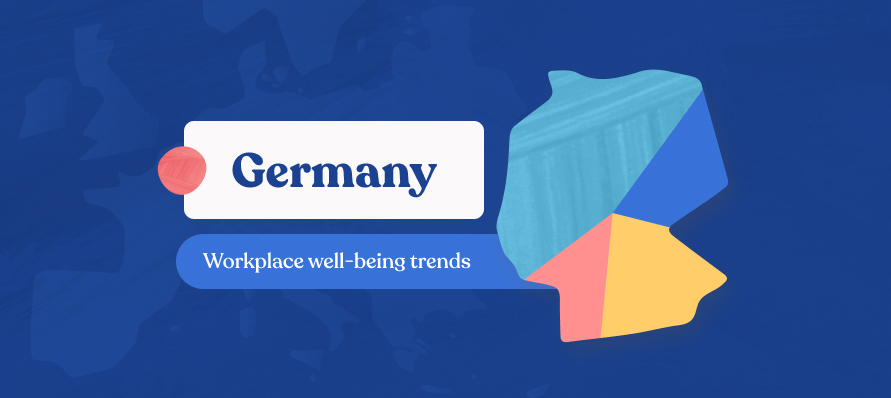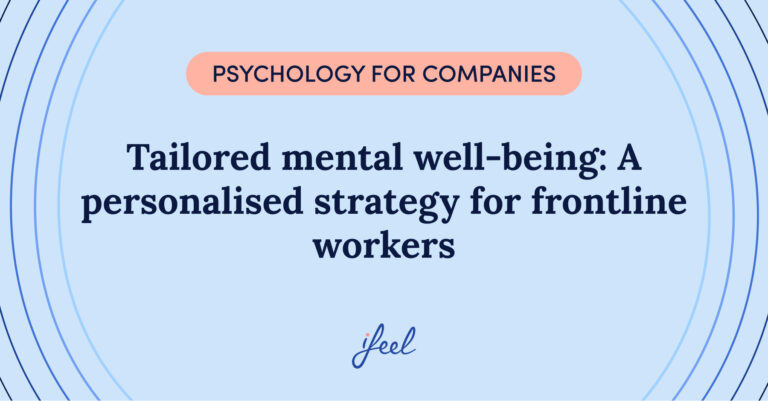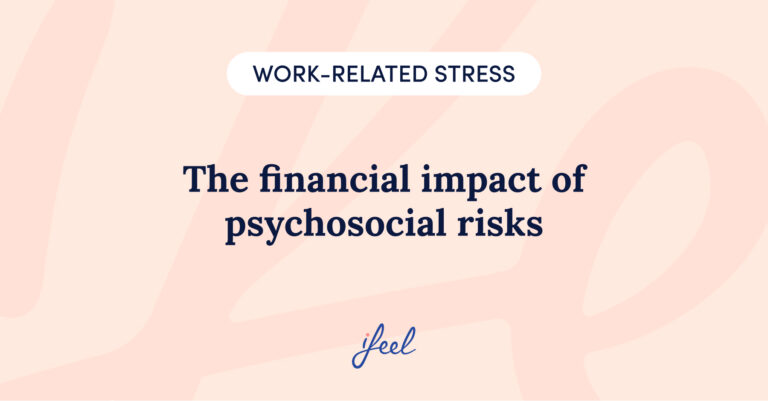Germany’s mental health landscape: A European perspective
As employee mental well-being rises to the top of European corporate agendas, Germany is no exception. Companies are recognising the importance of fostering healthy, balanced, and inclusive work environments. But how does Germany compare to the rest of Europe regarding supporting employee well-being?
Our research dives into key trends shaping workplace well-being in Germany, offering employers actionable insights and strategies for building more supportive and productive workplaces. Read on to explore trends in mental well-being, work-life balance, diversity, equity, inclusion, and belonging (DEIB), as well as personal and professional development.
👉 Want to go deeper? Download our free whitepaper, ‘Mapping the Impact,’ for exclusive insights on mental well-being across Europe.
Key well-being categories impacting German workplaces
Our analysis zeroes in on four critical areas that influence employee well-being:
- Mental well-being: Anxiety, depression, stress
- Work-life balance: Family responsibilities, maternity/paternity, sleep
- DEIB: LGBTQA+ inclusion, disability, sexuality
- Personal & professional development: Career growth, skills enhancement
Understanding these categories helps employers identify focus areas for improving workplace well-being and enhancing employee engagement and productivity.
A European snapshot: Employee well-being at a glance
- Mental well-being (38%)
Across Europe, mental well-being is the most significant concern, with 38% of employees identifying it as a top priority. Roughly 10% of Europeans experience mental health challenges like anxiety and depression, highlighting the need for strong workplace mental health initiatives. - Work-life balance (22%)
Balancing work and personal life remains a critical issue across Europe, with 22% of employees seeking better work-life integration. Flexible working conditions are increasingly seen as essential to maintaining employee well-being. - Personal & professional development (24%)
Career growth and skill development are key to employee satisfaction, with 24% of Europeans prioritising opportunities for personal and professional development. - DEIB (15%)
Diversity, equity, inclusion, and belonging initiatives are becoming more prominent, with 15% of employees calling for workplaces that reflect and embrace diversity.
How does Germany compare? A closer look at well-being trends
Let’s explore how Germany stacks up against the European averages and what employers can do to support the unique needs of their workforce.
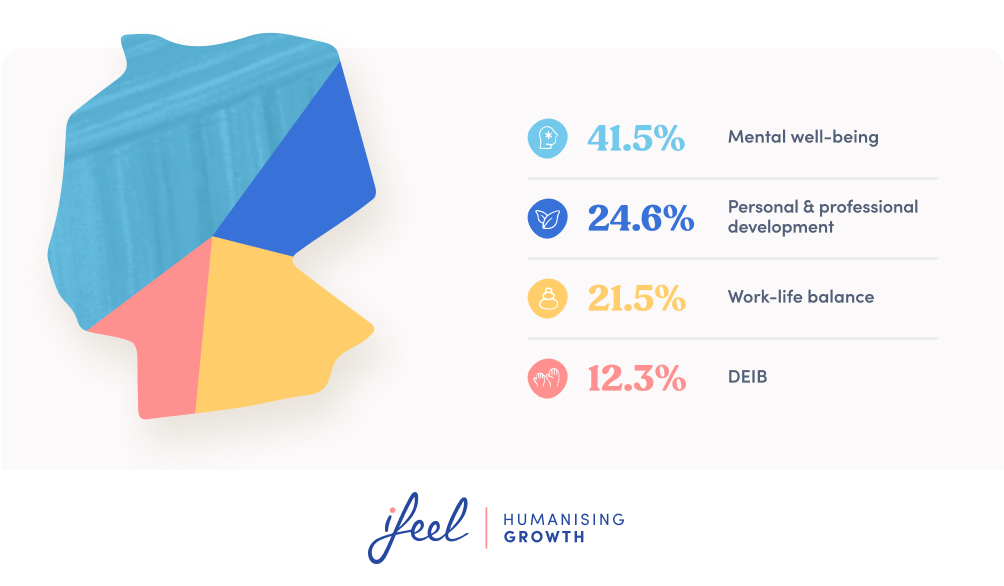
Mental well-being: 41% (Germany) vs. 38% (Europe)
Germany shows a significantly higher demand for mental well-being support, with 41% of employees seeking mental health services—above the European average of 38%. This aligns with findings from the Robert Koch Institute, which reported a rise in moderate to severe depressive symptoms from 9.2% in 2019 to nearly 22% in mid-2024, alongside a significant increase in anxiety disorders. Workplace stress, growing pressures, and heightened awareness of mental health have all contributed to this rise.
Implications for employers:
German companies must prioritise mental health by integrating comprehensive mental health resources such as therapy, counseling, and platforms like ifeel. Proactively addressing mental health concerns can reduce absenteeism, increase employee satisfaction, and improve overall productivity.
Work-life balance: 23% (Germany) vs. 22% (Europe)
Work-life balance is a significant concern in Germany, mirroring the broader European trend. At 23%, the demand for better balance aligns closely with the European average, as employees continue to seek flexible work arrangements and ways to manage both their professional and personal responsibilities effectively.
Implications for employers:
While Germany’s work-life balance trends are in line with Europe’s, companies must continue promoting remote work, flexible hours, and other initiatives that support employees in managing their responsibilities. Encouraging time off and maintaining a healthy balance will boost job satisfaction and productivity.
Personal & professional development: 24% (Germany) vs. 24% (Europe)
Germany’s demand for personal and professional development mirrors the European average. Employees recognise the importance of continuous learning and career progression in maintaining engagement and staying competitive in an evolving job market.
Implications for employers:
Investing in professional growth opportunities such as training programs, mentorship, and skill enhancement will keep employees motivated and help them adapt to changing industry needs. This not only increases job satisfaction but also improves employee retention and workforce readiness.
DEIB: Lower than European average
Germany shows a lower demand for DEIB initiatives compared to the European average. This could indicate that German companies have already integrated DEIB principles effectively or that cultural factors influence the perceived need for additional DEIB efforts. However, it might also suggest an opportunity for further improvement in promoting diversity and inclusion.
Implications for employers:
Even though demand for DEIB initiatives in Germany is lower, employers must continue fostering inclusive workplaces. Implementing inclusive hiring practices, DEIB training, and creating supportive spaces for all employees will enhance the workplace culture and help improve mental well-being by fostering a sense of belonging.
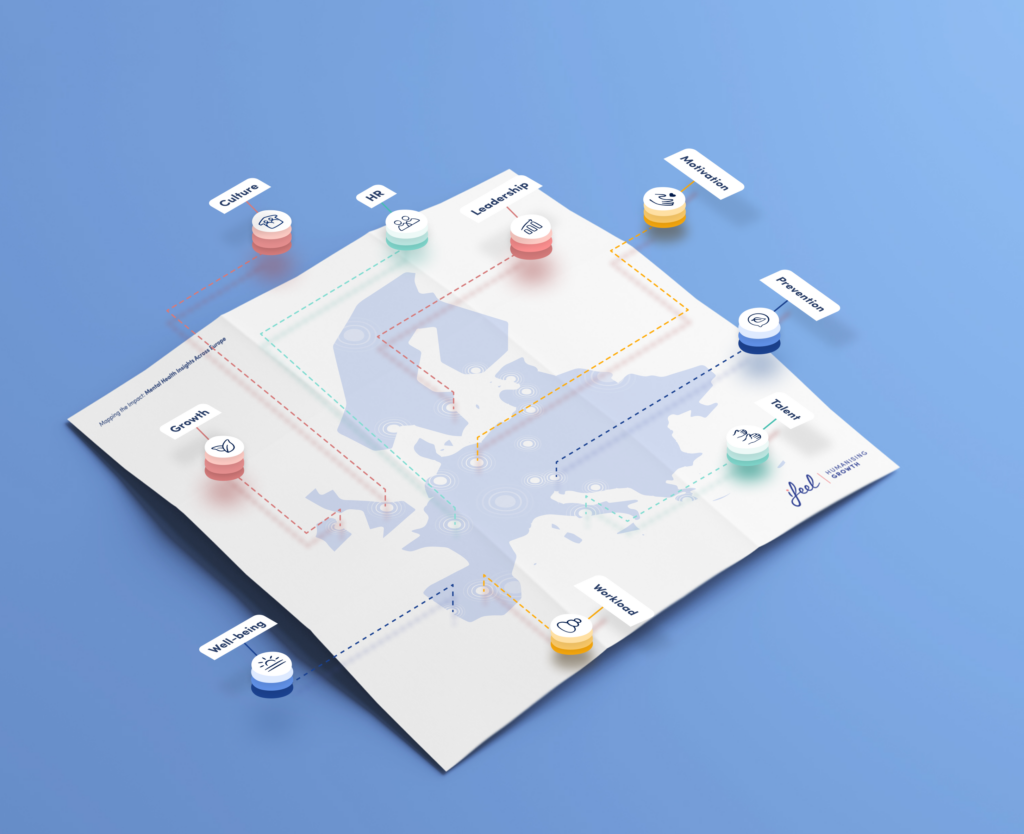
European leaders in mental well-being solutions for large organisations
Overall, the data for Germany highlights a strong focus on mental well-being and personal development, reflecting a societal commitment to improving mental health and fostering growth within the workplace.
To gain a deeper understanding of the mental health landscape in Europe, download the full report here.
Investing in employee well-being is not just a matter of compliance or corporate social responsibility; it is a strategic decision that can help companies thrive in an increasingly competitive and globalised market.
To assist in this process, our team of psychologists specialising in mental well-being has developed a mental well-being solution for large organisations aimed at helping companies enhance employee engagement and boost productivity.
This collaboration allows HR managers to receive personalised, data-based advice on the most effective measures for detecting employee mental health issues and assessing the workplace climate. It’s the best way to understand their needs.
We hope you found this article on key mental well-being trends in Germany interesting. If you want more information about our mental well-being solution for companies, simply request it, and we will contact your team soon.
